The first thing I remember about the day climate change arrived at my doorstep was how the clouds gathered heavily in the sky, swelling with the weight of impending doom. They turned bruised shades of purple and green as the light dimmed. I watched as they drank in enough moisture to drown the cornfields down the road, enough to summon a flash flood that would eventually swallow my home and everything I owned within a matter of minutes.
It was 2021, the year Tropical Storm Fred tore through my neighborhood in Western North Carolina like a vengeful spirit, taking seven lives and forever altering mine.
My dad called me earlier that day to warn me about bad weather heading my way. It had already been raining for hours at that point and the waters were starting to rise. Little did he know that the house I was living in sat on the banks of Hominy Creek, a significant waterway in Western North Carolina which fed into the ancient French Broad River like a vein. He didn’t know that my house (which I had just moved into a month prior, mind you) was perched precariously on silt and sand, and that my sense of security was as unstable as the eroding riverbed beneath me that day.
I wish I’d listened. I wish I had trusted the knot of unease that coiled in my stomach as I watched the creek rise, inch by inch, until it covered the outer banks and stretched into places I never thought it could reach. I told myself the water would recede; it always did. Surely, it couldn't rise high enough to touch the house. There’s no way could that ever happen.
I asked my roommates if we should be concerned, if maybe we should do something as the water continued to grow higher. They scoffed off my concern and carried on as if the storm were just another afternoon shower—chatting on the couch, laughing, making breakfast.
Meanwhile, the rain kept crashing on our metal roof like tiny, insistent fists from the heavens, and the clouds grew darker, more ominous. I wanted to believe everything would be fine. But deep down, I knew, I knew.
Seven hours of relentless rain later, it had finally stopped. The creek had risen many feet, just barely leveling with the foundation of the house, but the worst seemed to be over. I let out a breath I didn’t know I’d been holding so tightly.
My dear friend Tim, the owner of the house, stood beside me, studying the sky with cautious awareness. We watched the water flow quickly by, and for a brief moment of foolish optimism, we felt lucky. The storm seemed to have spared us just in time. "Let’s celebrate by taking a unicorn floaty down the creek," I joked, and we laughed.
Tim drove off, reassured, and I returned inside, convinced the danger had passed. But minutes later, as he crossed the bridge and travelled down the road, the floodwaters descended with a sudden and ferocious fury. A flash flood. It came roaring down the mountain like an unleashed beast, turning the creek into a surging torrent that exploded onto our deck, invading our kitchen with unstoppable force.
As the river spilled into the house, I made my way to the front door and pressed all my might against it to try and buy some time, the sheer force and intensity of the flood making it nearly impossible to close it shut. Water proceeded to seep in through every crack and crevice, filling the room in a matter of minutes.
I watched the river travel back into the living room, dislodging built in furniture which became buoyant as it floated across the room. Treasured art pieces were swallowed up in an instant by the current, the water rising past my ankles which I slowly sifted through as I made my way back into my bedroom to try and salvage any valuables before it engulfed everything.
The water, now ankle-deep, lapped at my legs as I frantically entered my bedroom, grabbing whatever I could—my phone, keys, laptop, anything before it all disappeared.
I was able to deliver my first armful of possessions to higher ground across the street, where a crowd had gathered, watching in stunned disbelief as our home was swallowed whole by a ravenous river.
I made trip after desperate trip, dragging my body through the now waist-deep murky waters, salvaging fragments of my life, a passport, a handful of cherished books, my sacred stash of medicine. There was no time to think. My animal body just kept moving, rushing back and forth until I was swimming out of my living room, holding bags of my belongings above my head to keep the water from taking them, and me.
By then, the water had filled the road, erasing the solid ground I had walked on just moments before. The only thing between me and being swept away was a flimsy metal fence which I clung to with every bit of strength I had, my tiny fingers digging into the diamond shaped holes as the floodwaters surged against me, the mud and toxic debris wrapping around my legs and absorbing into my skin, leaving a huge rash on my thigh that lingered for days afterwards.
At this point, I was drenched up to my neck, trembling with shock, but I kept wanting to go back in. Over and over, I pushed through the water to collect my things until the crowd finally begged me to stop. They were right—it was too dangerous now. I stood on the road, watching the river swallow everything I owned, completely powerless to stop it. I screamed in agony. I sobbed like a child watching her life being ripped away by the hands of nature, knowing there was nothing I could do.
That was the last day I was able to call this place my home.
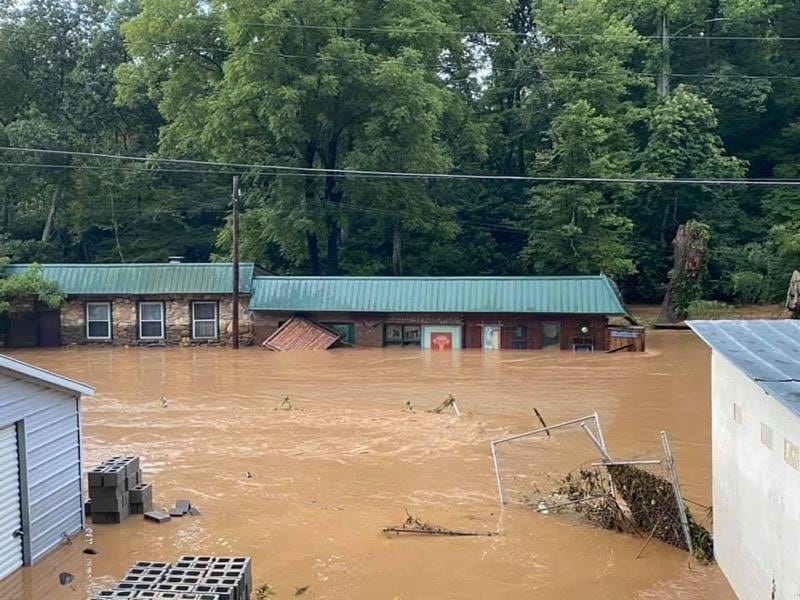
For the days and weeks ahead, I awoke in a state of panic and cried so hard my tears could have carved canyons. But through this massive reality altering experience, I was held, lifted by the arms of family, resuscitated by the strength of my community. My friends gave me safe places to grieve the loss that had shattered my world, as I slowly and painfully began to rebuild my life from scratch.
I’m sharing this now because, only three years after the day I nearly drowned in a flash flood, I have survived yet another unthinkable weather event. This time, it was to the tune of the historic Hurricane Helene—a Category 4 storm that left deep and widespread destruction across Western North Carolina, far surpassing the impact of the tropical storm that took my home. No one was spared from the devastation that Helene brought with her. Lives were swallowed up—so many, we may never know the full count. Homes vanished and entire livelihoods disappeared in an instant.
For weeks, our new reality was one of blackouts and broken roads, empty shelves where food once stood, gas shortages, dry taps, and mud thick with contaminants. For some that were on the outskirts of central Asheville, tucked away in the hollers and more rural regions, aid took longer to arrive. Some couldn’t evacuate for weeks because the only road coming to and from their homes was completely washed out.
For over a month now, Asheville has been under a boil water advisory, with murky, tainted water still running from taps where families used to drink from and bathe their children in. We are far from okay, far from recovered—and it will take some time before we can safely say we are.
The damage is extensive and the trauma still lingers here. The Blue Ridge Mountains, once my sanctuary, have been transformed, in some areas completely beyond recognition.
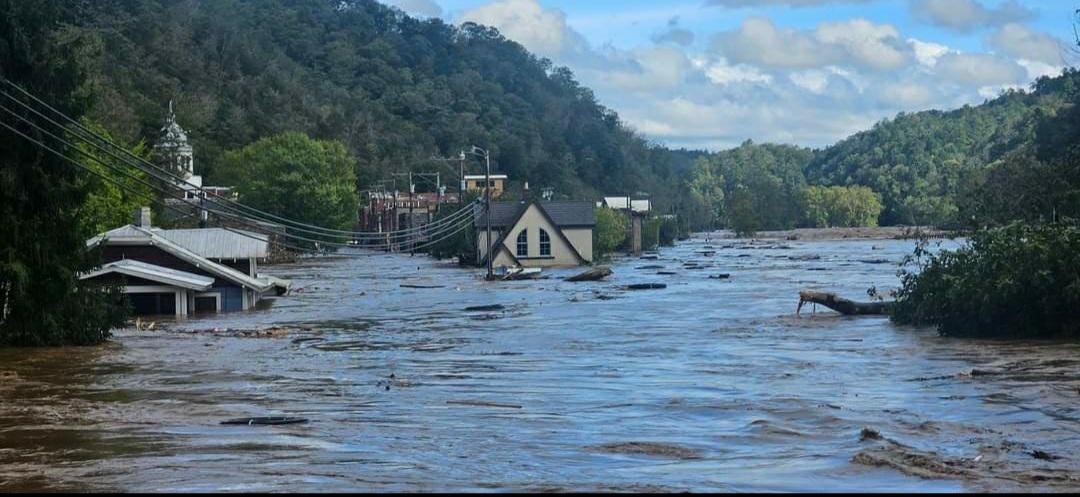
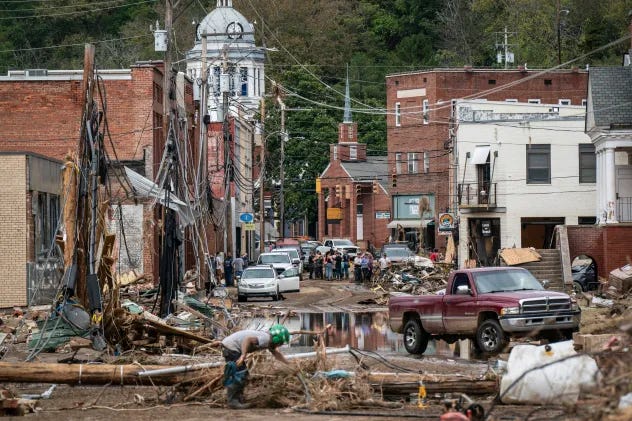
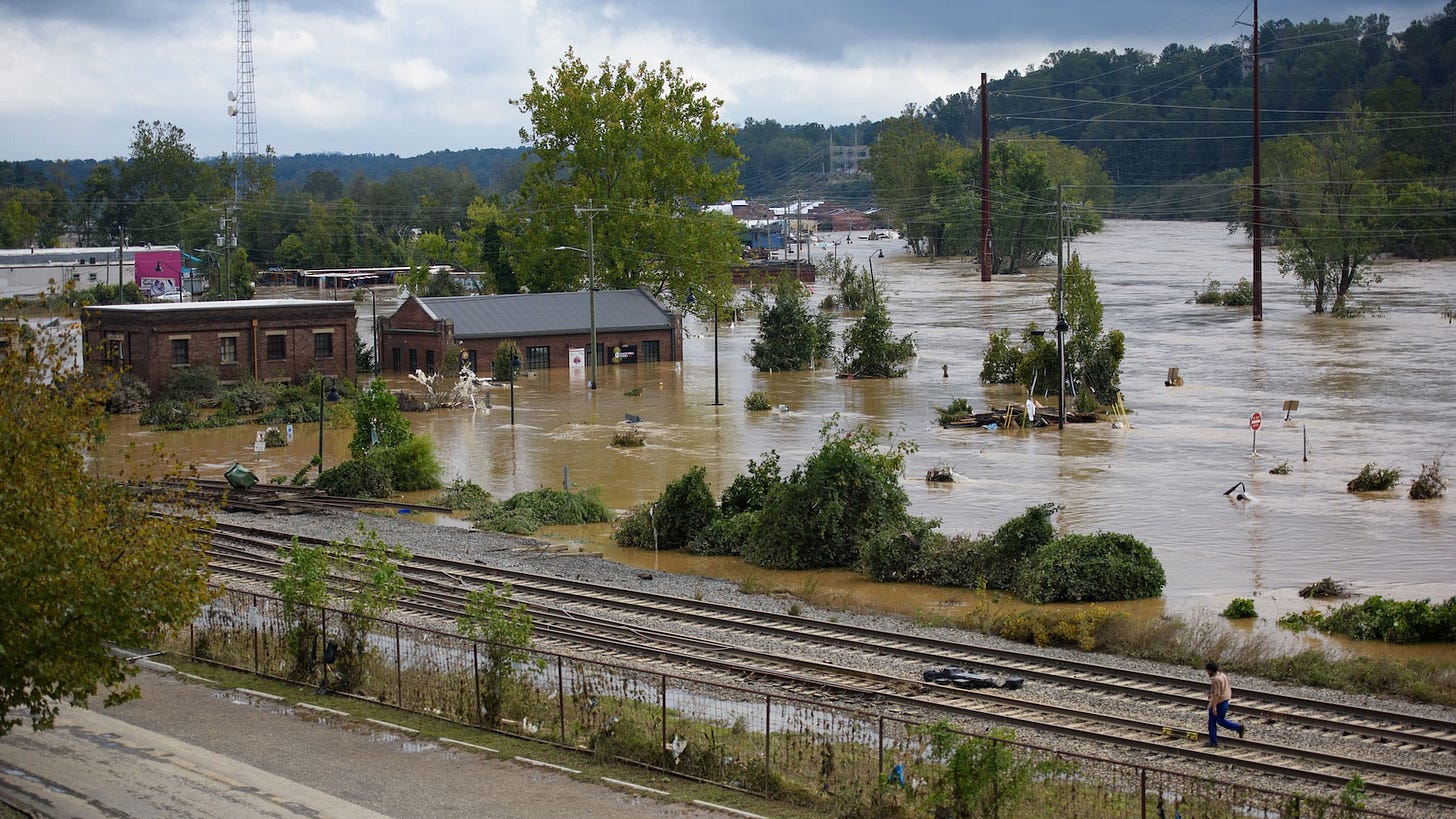
I am grateful—so profoundly grateful—that my home was intact after Helene had passed, and that the floodwaters didn’t come for me this time. My experience wasn’t as raw, as visceral, as that day three years ago when a flash flood claimed my body in its grip, when I swam through those toxic waters to the shores of safety and watched my world get swept away. But still, the shock remains and sinks heavy on my chest. Every day, I carry the weight of what my community is still enduring. Although it’s been over one month since Helene hit, the grief is still permeating the air, and it feels heavy, palpable.
It feels surreal to witness others now living through what once felt like my personal nightmare. My story no longer feels unique—we all carry a piece of that destruction in our hearts now, as if a shared memory has woven itself into the fabric of who we are as a community.
It’s almost laughable now, the thought that one of the main reasons I moved from New York City to Asheville back in 2014 was to escape this very chaos. I came here seeking refuge from climate change, which I knew was looming on the horizon. At 2,200 feet of elevation and over 300 miles away from the nearest coast, who would have ever imagined that I would experience two historic flood events in the span of three short years?
I came here to Asheville to connect with the Earth and seek solace and safety. I dove deep into permaculture, botany, herbalism—living off-grid, surrounding myself in a rich plethora of biodiversity and a tight knit community fed by a well of love and reverence for the Earth. I wrapped myself in the security blanket of these ancient mountains, believing I had finally found a haven to call home.
For a time, I felt invincible—untouchable, sheltered, part of something larger, and profoundly safe. This must be the place, I thought, a sanctuary from a world descending into chaos.
But I know better now. These storms, their rage, their destruction—they aren’t normal, they aren’t natural. They are the Earth’s cries, a warning of a deeper illness we’ve brought upon her through our consumptive, extractive, ecocidal society, hellbent on trading in our children’s future, the vitality of our non-human kin, and the integrity of our biosphere for some short-term profit.
I’ve studied climate change extensively for years, but living through its direct impact, again and again, strips away any illusion that there is a 'safe place’ from its effects. Climate change is no longer some distant, looming threat on the horizon—it’s here, right now, in our neighborhoods, creeping into our homes and businesses, woven into the very fabric of our present reality.
As the atmosphere continues to warm, tipping our planet further into peril, weather events will only grow more intense, more erratic, more devastating and unpredictable. The impacts are already being felt worldwide in ways that were once unheard of.
Having lived through the unthinkable, I now navigate a world marked by a slow-motion apocalypse, and I can’t help but wonder what it will take for us to break free from the suffocating grip of the fossil fuel industrial complex and embrace a culture that is truly regenerative and life-affirming. How many unprecedented storms must we endure before we finally awaken from our collective numbness to the reality unfolding around us? How many millions of climate refugees must flee from their homes until we grasp the urgent need to redesign our infrastructure? How many irreplaceable species will vanish before we recognize that our survival is intimately tethered to theirs? When will we finally realize that we can meet our needs without destroying the life support systems that sustain us?
Deep down, we already know all of this. Yet, despite holding this knowledge, we are still not doing nearly enough to act on it and curb the worst of what’s coming. The cognitive dissonance this causes has been deafening and at times, truly unbearable.
Despite all of the destruction we are personally living through, whether it’s through climate change, the ongoing atrocities of war, and the myriad sufferings unfolding across our planet—these are, in many ways, extraordinary times. We hold in our hands more knowledge and power than our ancestors could have ever imagined. Just a century ago, who could have envisioned that we’d have such vast, limitless access to information, that we would have the tools needed to reshape our future? Right now, we have all the solutions we need. The science is here, the innovations are within reach.
It is not the lack of solutions that hinders us, but rather our inability to integrate them into our worldview and societal frameworks. It is not a question of possibility, but of choice—to choose life, to prioritize it above all else, is perhaps one of the greatest tasks of our time. We are being called to choose a path that leads not to our destruction but to regeneration and mutual thriving. The future rests not in our capability, but in our courage to act on what we know. I believe the way we can do this is on a local level.
After surviving this most recent catastrophe, the most awe-inspiring thing I’ve witnessed isn’t the destruction—it's the collective strength within our community rising up to meet the aftermath of Hurricane Helene. More than the storm that reshaped our land and cities, it’s our resilience, our unity, that has rendered me speechless. We have never been stronger or more tightly woven together. If we didn’t know our neighbors before, we certainly do now, as we’ve put aside our differences to face the undeniable truth—we are all connected.
And perhaps, in this devastation, there is a silver lining. We are more prepared now, more aware of what lies ahead, as strange and unpredictable weather events continue to intensify and shape our world.
I want to believe that we are waking up—emerging from a millennia-long slumber into a new way of being, a new relationship with our world, with each other, and with ourselves. That the destruction we are witnessing, though profoundly heartbreaking, is the catalyst for a great transformation already stirring beneath the surface. Perhaps this great unraveling and the chaos we are living through is just the awakening we so desperately need—a call to rise together, to rebuild not just our communities, but the very fabric of our existence, stitched together with resilience, compassion, humility, and a deeper understanding of our place in this intricate web of extraordinary life that we get to be part of.




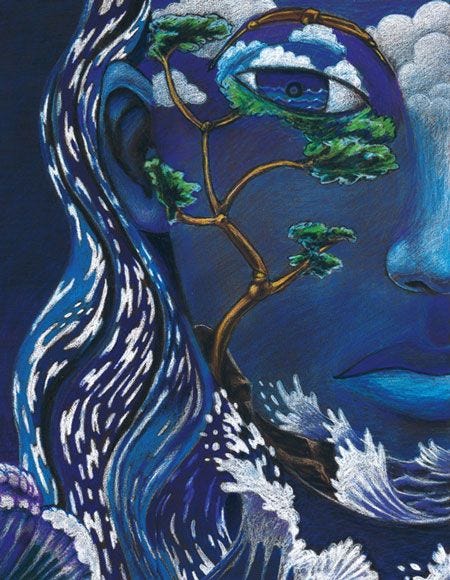
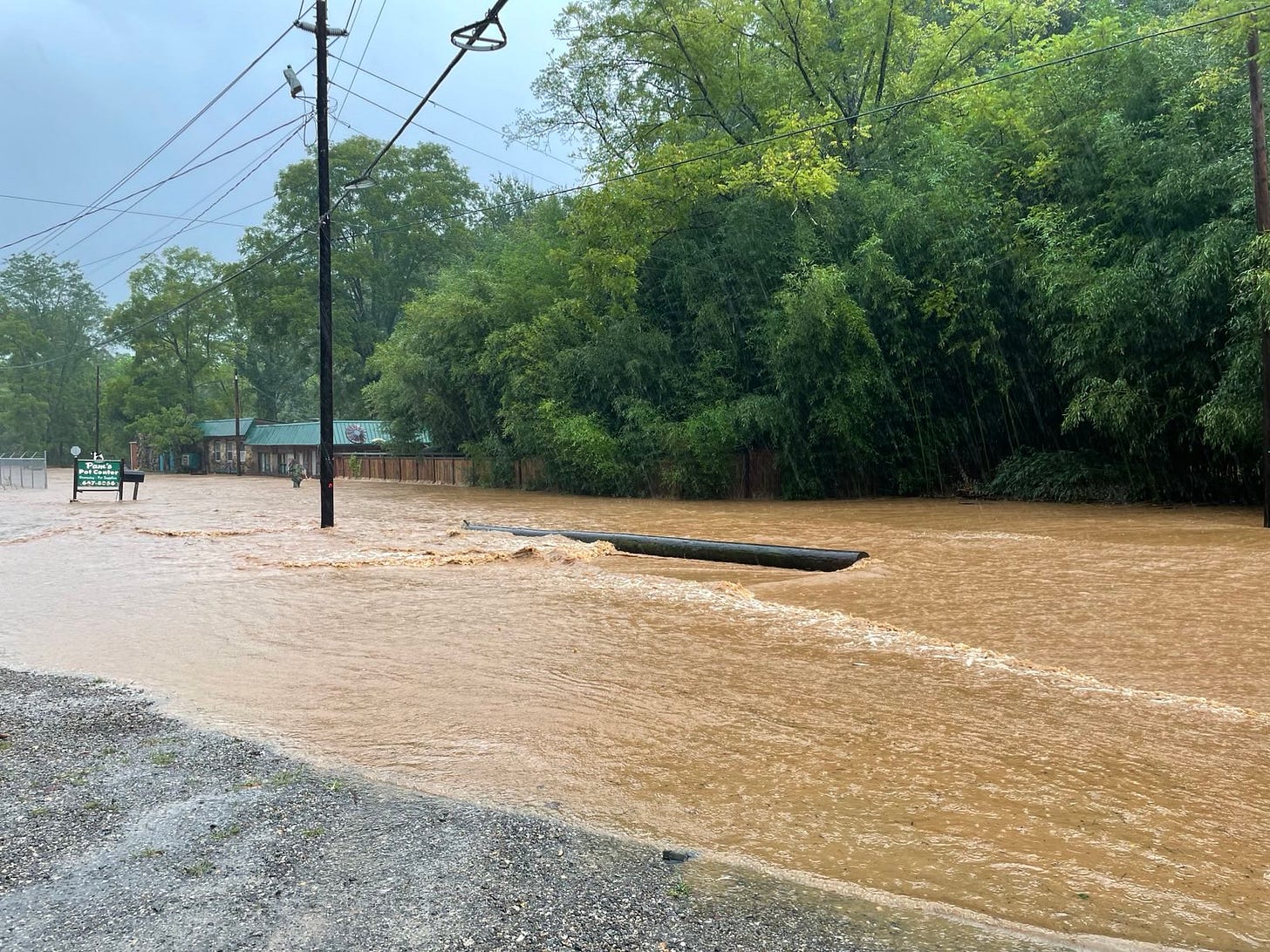
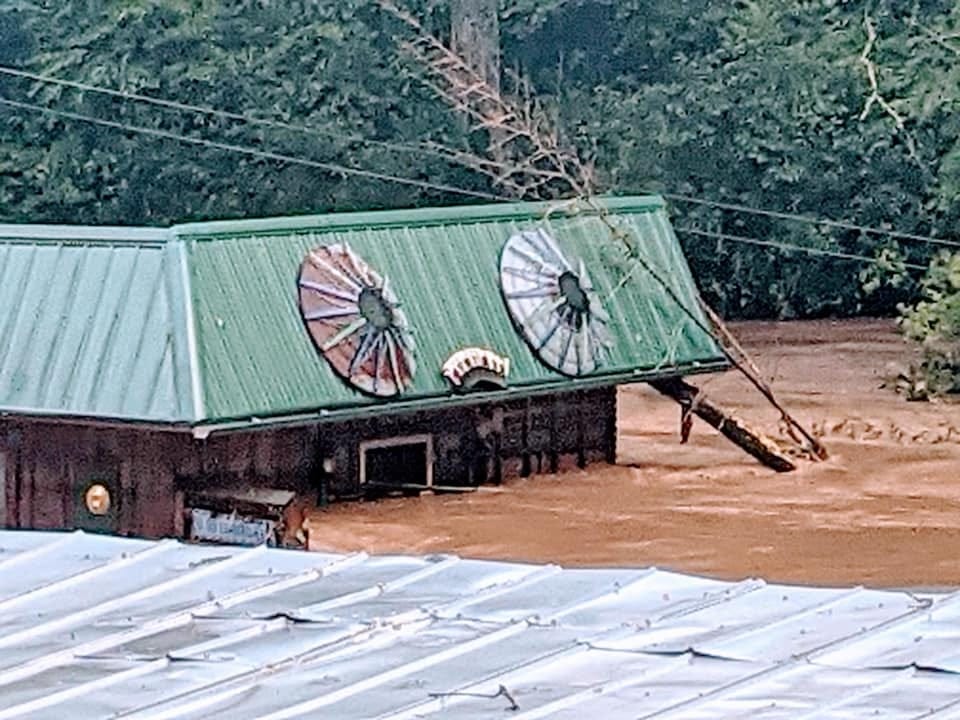
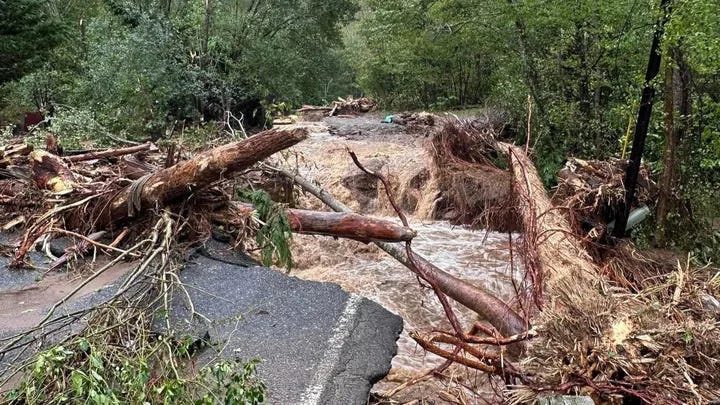
Absolutely beautiful, dear one.
This incredible poem changed our lives. Thank you for sharing Sarah and being open to our community.